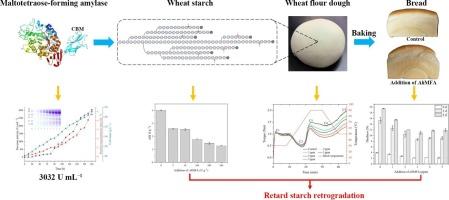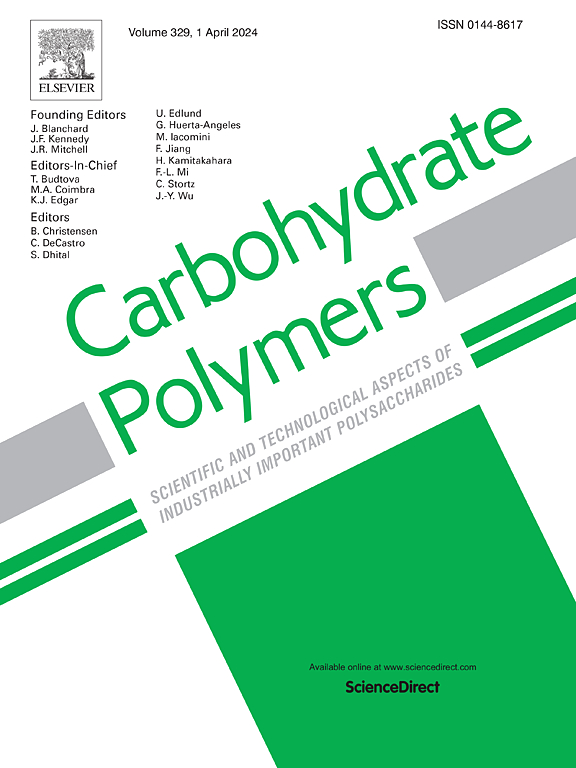用一种来自胡森氏阿托单胞菌的新型麦芽四糖形成淀粉酶对小麦淀粉进行酶促改性,以延缓逆变并改善面包质量
IF 10.7
1区 化学
Q1 CHEMISTRY, APPLIED
引用次数: 0
摘要
为了延缓淀粉逆变性和提高面包质量,一种来自胡森阿托单胞菌的新型麦芽四糖形成淀粉酶(AhMFA)被表达到 Komagataella phaffii 中。经过高细胞密度发酵后,酶活性达到了 3032 U mL-1 的最高水平。AhMFA 在 pH 值为 6.0 和温度为 55 ℃ 时分别显示出最佳活性。用 AhMFA 在 55 °C 下处理生小麦淀粉 1 小时后,其相对结晶度从 24.5 % 降至 20.8 %,且未改变 A 型结晶模式。带有 A、B1 和 B2 链的侧链成分分别减少到 27.5%、44.9% 和 13.8%。小麦淀粉的逆变焓显著降低了 67.8%。此外,Mixolab 参数(C5 和 C5 - C4)的降低表明,AhMFA 减少了小麦面团的淀粉逆变。与对照组相比,添加 AhMFA(3 ppm)后,面包的比容增加了 29.5%,硬度降低了 46.1%。添加了 AhMFA 的面包具有良好的防结块特性,在 4 °C 下存放 4 天后,其硬度比对照组降低了 43.7%。这项研究为淀粉改性提供了一种新型麦芽四糖淀粉酶,可延缓淀粉逆变,提高面包质量。本文章由计算机程序翻译,如有差异,请以英文原文为准。

Enzymatic modification of wheat starch by a novel maltotetraose-forming amylase from Atopomonas hussainii to retard retrogradation and improve bread quality
To retard starch retrogradation and improve bread quality, a novel maltotetraose-forming amylase (AhMFA) from Atopomonas hussainii was expressed in Komagataella phaffii. After high cell density fermentation, the enzyme activity reached a maximum level of 3032 U mL−1. AhMFA showed optimal activity at pH 6.0 and 55 °C, respectively. After raw wheat starch was treated with AhMFA at 55 °C for 1 h, the relative crystallinity decreased from 24.5 % to 20.8 % without changing the A-type crystalline pattern. The side chain components with A, B1 and B2 chains were reduced to 27.5 %, 44.9 %, and 13.8 %, respectively. The retrogradation enthalpy of wheat starch decreased significantly by 67.8 %. Moreover, the decreased Mixolab parameters (C5 and C5 − C4) indicated that AhMFA reduced starch retrogradation of wheat dough. After addition of AhMFA (3 ppm), the specific volume of bread increased by 29.5 % and its hardness decreased by 46.1 % compared to the control. The AhMFA-added bread exhibited good anti-staling properties with 43.7 % less hardness than the control after storage at 4 °C for 4 days. This study provided a novel maltotetraose-forming amylase for starch modification to retard retrogradation and improve bread quality.
求助全文
通过发布文献求助,成功后即可免费获取论文全文。
去求助
来源期刊

Carbohydrate Polymers
化学-高分子科学
CiteScore
22.40
自引率
8.00%
发文量
1286
审稿时长
47 days
期刊介绍:
Carbohydrate Polymers stands as a prominent journal in the glycoscience field, dedicated to exploring and harnessing the potential of polysaccharides with applications spanning bioenergy, bioplastics, biomaterials, biorefining, chemistry, drug delivery, food, health, nanotechnology, packaging, paper, pharmaceuticals, medicine, oil recovery, textiles, tissue engineering, wood, and various aspects of glycoscience.
The journal emphasizes the central role of well-characterized carbohydrate polymers, highlighting their significance as the primary focus rather than a peripheral topic. Each paper must prominently feature at least one named carbohydrate polymer, evident in both citation and title, with a commitment to innovative research that advances scientific knowledge.
 求助内容:
求助内容: 应助结果提醒方式:
应助结果提醒方式:


